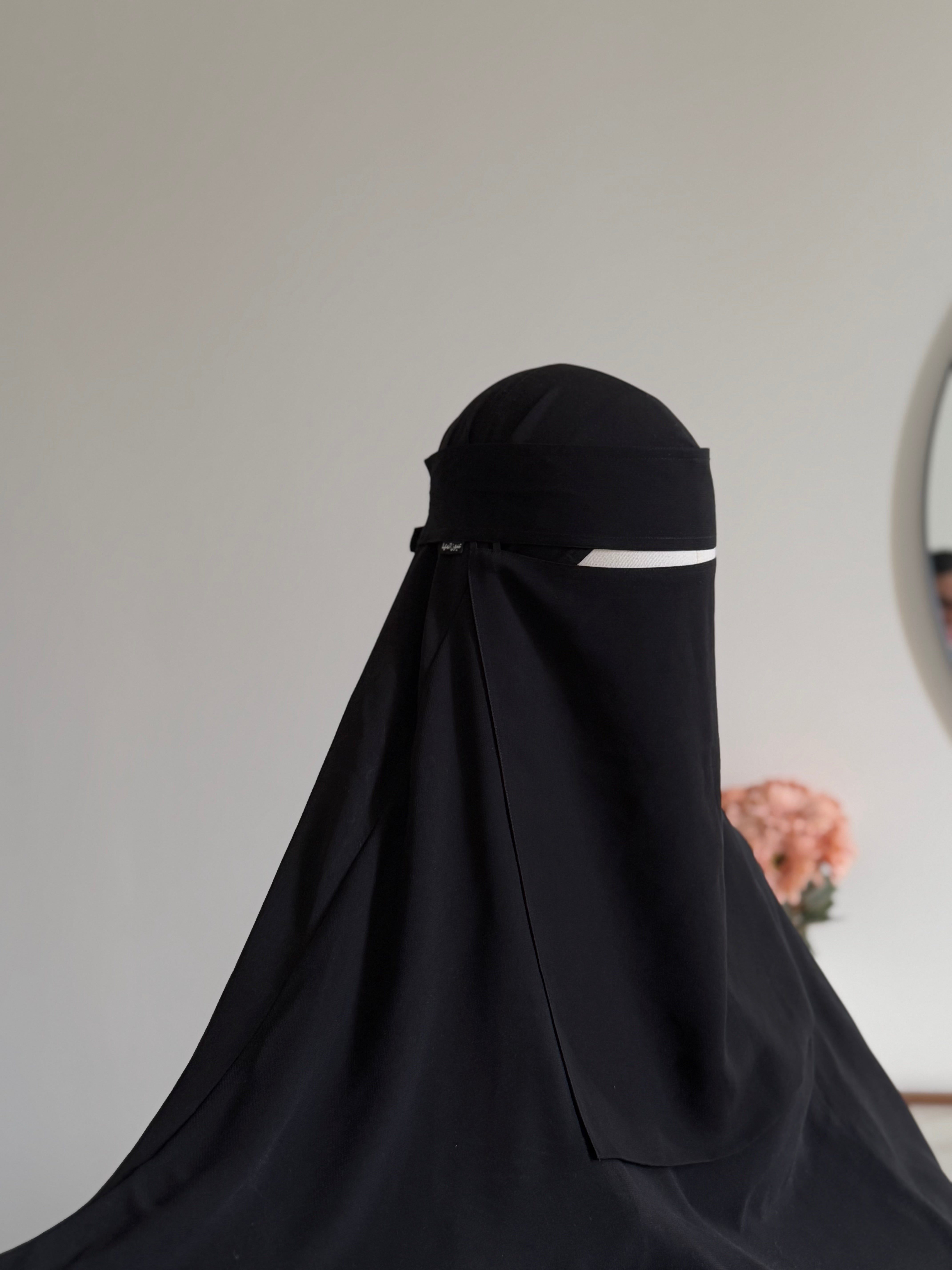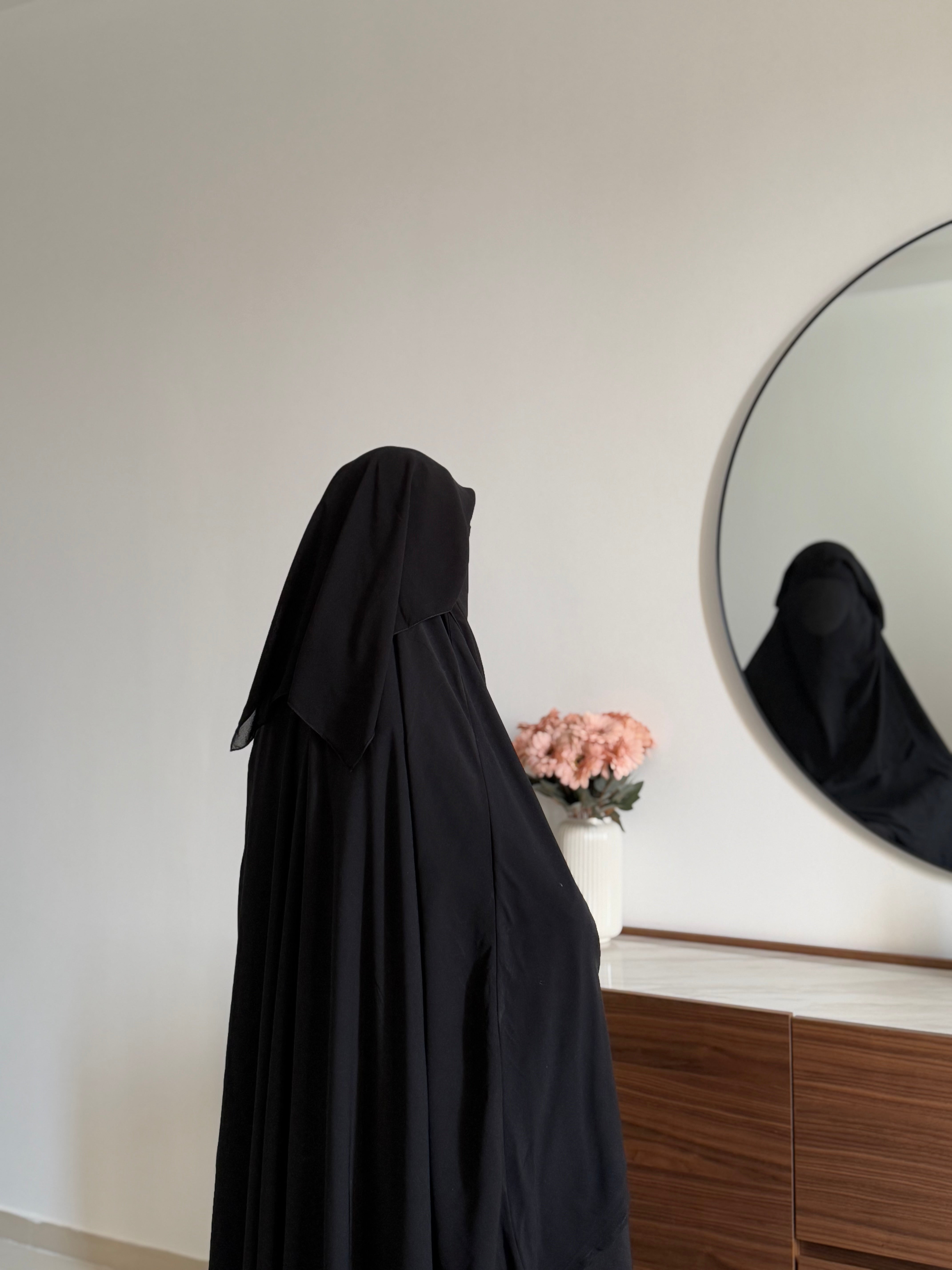THE VEIL OF THE MUSLIM WOMAN
·

·
Before all things, know oh my sister that the veil is a Divine obligation.
It is the symbol of our preservation and a manifestation of our obedience to Allah. It strengthens the piety and morality of the Muslim woman.
Allah tells us:"O Prophet! Tell your wives, your daughters, and the wives of the believers, to bring back their large veils: they will be recognized more quickly and will avoid being offended. Allah is Forgiving and Merciful.[Sourate Al Ahzab, v.59]
The Quran as well as the Sunnah enjoins us to respect different conditions regarding this order:
I. That it covers the whole body except face and hands
Shaykh Al Albani رحمه الله is of the opinion that uncovering the face is allowed, but covering it is better/preferable:
"That doesn't mean it's not legitimate to cover them, though. On the contrary, it is what is preferable as I have detailed in a specific chapter that I have recorded in the 3rd edition of the aforementioned work under the title: Legitimacy of covering the face” (p.47-53 )
II. That it is not an adornment in itself
The purpose in the order of the jilbab is to cover the adornments of the woman, knowing this, it is incomprehensible that the jilbab is an adornment in itself.
This, as you can see, is a clear thing that cannot be hidden.
This is why Imam Al Dhahabi said in his book “The Great Sins”:
“Among the acts which make the woman cursed: it is that she makes her adornment appear like: her gold, her pearls, her perfume when she leaves her home. As well as, when she wears clothes in silk fabric, short dresses and wide and long sleeves.
And know that it is permissible for a woman to wear a garment of a color other than white or black, and this is not considered a forbidden adornment (zina), as some women might think. This for two reasons :
♦ The first
La parole du Messenger d’Allâh, may God’s prayers and peace be upon him, qui dit:
"The perfume of a woman is that whose color is apparent, and the odor is not."
[Reported by Abu Dawod, Nassai and it is an authentic hadith]
♦ The second
Because the women of the Companions of the Prophet صلى الله عليه وسلم practiced this.
Here is some genuine athar about this that al Hafiz bin Abu Shayba reported in “Al Moussannaf”:
1• Ibrahim, who is al Nakh'i, reports: “That he entered in the company of 'Alqama and al Aswad among the wives of the Prophet Peace be upon him and they saw them dressed in red.”
2• Ibn Abou Malika a blog post: “I saw Oum Salama رضي الله عنها wearing a garment dyed with safflower.”
3• Al Qassim, who is Ibn Mouhammad bin Abou Bakr al Siddiq rapporte: "That 'Aisha رضي الله عنها wore clothes dyed with safflower while she was in a state of sacredness (muhrima)."
And according to another variant, also reported by Al Qassim:
"Aisha wore safflower-dyed clothes while she was in a state of sanctification."
4• Hisham reports, according to Fatima bint Al Moundhir: “That Asma wore safflower-dyed clothes while she was in a state of sanctification.”
5• Sa'id bin Zhubayr reports: “Having seen certain wives of the Prophet Peace be upon him doing the tawaf around the Sacred House (al Ka'ba) and they wore safflower dyed clothes.
III. Let it be thick and not transparent
Oum 'Alqama bin Abou' Alqama a dit:
“I saw Hafsa bint 'Abdoul Rahman bin Abu Bakr entering 'Aïcha, she (Hafsa) was wearing a thin and transparent veil. 'A'isha then tore it up and said, "Do you not know what Allah has revealed in Surah: The Light?!" She then asked for another veil to be brought to her.
[Reported by Ibn Sa'd and it is valid as argument]
And we can understand from the words of 'Aisha رضي الله عنها:
"Do you not know what Allah has revealed in Surah: The Light?!"
That she who wears a transparent veil is not considered to be veiled and she will not have put into practice the order of the word of Allah in sura The Light verse 31:
“and let them pull back their veil on their breasts”
And this is clear.
Hisham bin 'Ourwa reports:
“Al Mundhir bin Zubayr returned from Iraq, he sent Asma bint Abu Bakr (his mother) a garment of Marw which was fine.
And this, after she became blind.
He said: "She touched the garment with her hands and then said:
"Ouffin, give him back this garment!"
He said: It was difficult for him and he said: "O mother! He is not transparent."
She then said: "It may not be transparent but it draws the body."
[Reported by Ibn Sa'd with an authentic narrator chain up to Al Moundhir]
IV. That it is wide and not tight
Because if it is tight, it may veil [the color of the person] but will draw his body or certain parts of his body; that men will imagine.
Oussama bin Zayd a post:
“The Messenger of Allah Peace be upon him dressed me in a thick qutbiya given to him by Dahya al Kalbi. I had it carried to my wife.
The Peace be upon him said to me, "Why don't you wear your qutbiyya?"
I tell him: "I had it taken to my wife."
The Peace be upon him said to me: "Order him to put another garment underneath, because I'm afraid it will draw his body."
[Reported by Daha Al Maqdissi in: “AlHadith Al Moukhtara”, Ahmad and Al Bayhaqi with a good narrator chain]
The Messenger of Allah صلى الله عليه وسلم ordered the woman to wear a garment under her qutbiyya so that it does not draw her body.
This order proves that it is an obligation as it is known in al usul.
This is why Al Shawkani said while explaining this hadith:
"This hadith proves that a woman must veil her body with a garment that does not draw her, and this is a condition for those who wish to cover their nudity ('awra) and it Peace be upon him ordered to put another garment under the qibati because it is a [thin] garment that does not veil the body from view, but certainly draws it.”
V. Let it be unscented
Abou Moussa al-Ash'ari rapporte that the Messenger of God, may God bless him and grant him peace, wrote:
"Any woman who wears perfume and then leaves her house passing near a group of people so that they can smell her perfume, is a fornicator."
[Reported by Nassai. Abu Dawod. Tirmidhi who said: "good-valid-safe" (hassan sahih). Al Hakim said: "his narrator channel is good and Al Dhahabi approved him"]
Al-Haythami in a blog post by Al-Zawajir:
"That the fact that a woman leaves her home perfumed and adorned, is one of the great sins, even if her husband allowed it!"
VI. That it doesn't look like men's clothes
Abou Hourayra a post:
"The Messenger ofAllâh Peace be upon him cursed the man who wears women's clothes and the woman who wears men's clothes."
[Reported by Abu Dawod. Ibn Majah and Al Hakim who say: "it is authentic according to the standard of Moslim." It has been approved by Al Dhahabi and it is as they both said]
Le Messager d'Allâh, may God bless him and grant him peace, a dit:
“There are three categories of people who will not enter Paradise and whom Allah will not even look at the Day of Resurrection:
- The one who has a bad behavior towards his parents.
- The woman who behaves like a man and who tries to look like them.
- The one who has no jealousy.”
[Reported by Nassai and Al Hakim who say, "His narrator chain is genuine." And it was endorsed by Al Dhahabi]
VII. That it does not look like the clothes of non-Muslims
It has been decreed in Islamic law that it is not permissible for Muslims, male or female, to try to resemble the disbelievers whatsoever:
- in their worship
- their parties
- or their external aspects (specific to them).
This is a very important rule in Islamic law, which unfortunately nowadays has been overlooked by many Muslims. And even some who take care of the preaching and this, out of ignorance, or due to the fact that they follow their passions, or because of their subsidence to the customs and habits of their time or by imitating Europe.
'Abdullah bin Omar a ditty:
Le Messager d'Allâh, may God bless him and grant him peace, a dit:
"I was sent between the end of time, that Allah be worshiped only without associates, and my sustenance is under the shadow of my spear. And the humiliation and belittling is in contradicting my orders, so whoever tries to look like a group of people is one of them."
[Reported by Ahmad with a good narrator chain]
VIII. Let it not be a garment of convenience
Fashionable/famous clothing: this is any clothing that one wears in order to be known by people, whether it is a luxury garment or an ugly garment that one wears in order to pass off as frugal or ostentatious.
Al Shawkani a blog post:
“Ibn al Athir said: “Fame (al shouhra) is showing something. attracts the gaze of others (and this, to surprise them and astonish them by pride).
According to the hadith of Ibn 'Umar who says:
The Messenger ofAllâh Peace be upon him said: "Whoever wears a garment that attracts attention (shuhra) in life here below, Allâh will make him wear a garment of humiliation on the Day of Resurrection then (this garment) will catch fire.”
[Reported by Abu Dawod and Ibn Majah and his narrator chain is authentic]
Al Shawkani a blog post:
“This hadith proves the prohibition of wearing (famous) fashion clothing, but this hadith is not specific (to fashion clothing). But it is the same for the one who wears poor clothes in order to be seen by people and to attract their attentions.
And if one wears a garment for the purpose of being known by people, then there is no difference between one who wears a luxury garment or a mediocre garment, a garment similar to or different from that of the people, for the prohibition here is that it be worn for the purpose of being known by people.
Cheikh Mouhammad Nacer-dine Al-Albany - Sheikh Muhammad Nacer Al-Din Al-Albany


